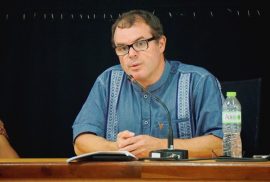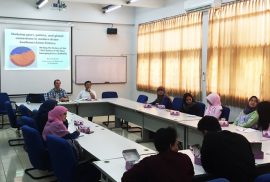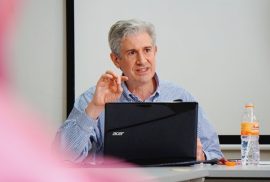Masih sangat jarang, dalam historiografi Indonesia pada khususnya yang membahas olah raga sebagai topik kajian sejarah. Berpijak dari hal itu, Departemen Sejarah FIB UGM mengadakan kuliah umum secara beruntun. Masing-masing pada Jumat (10/2) dan Senin, (13/2). Kuliah umum mengundang Dr. Russell Field dari University Of Manitoba. Ia adalah assisten Profesor yang menggeluti tema olah raga, khususnya relasi olah raga dan politik. Pada pertemuan pertama, Jumat (10/2), Dr. Russel lebih menyoroti olah raga dan historiografi.
Dr. Russell Field, pada Jumat (10/2/2017) berkesempatan hadir untuk mengisi kuliah umum di Ruang Sidang I, Gedung Purbatjaraka Fakultas Ilmu Budaya UGM. Asisten peneliti dari University Of Manitoba Canada, itu memberi kuliah umum dengan tema “Studying Sport, Politics, and Global Conection ”. Acara itu diselenggarakan oleh Departemen Sejarah Fakultas Ilmu Budaya UGM. Kuliah umum itu adalah pertemuan pertama, dari rencana dua kuliah umum yang akan diselenggarakan tentang olah raga dan sejarah.
Dr. Russell membicarakan tentang relasi olah raga dan perkembangan politik global kala 1963. Dia berangkat dari penelitiannya tentang Games Of New Emerging Force (Ganefo). Pesta olah raga itu dihelat di Jakarta pada 1963 atas prakarsa Presiden Indonesia saat itu, Soekarno. Meski begitu Russell tidak begitu mendalam memaparkan tentang Ganefo. Ia memfokuskan pembahasan pada olah raga sebagai subjek penelitian sejarah.
Kajian sejarah perkotaan menjadi menarik akhir-akhir ini. Kota pada bagian tertentu mempunyai roh. Ia bisa menjadi cerminan, atau pun perwujudan visi. Meski begitu kota pun menyimpan banyak masalah yang perlu untuk dikaji lebih mendalam : pemukiman kumuh, penataan kota, penduduk, dan masalah lingkungan perkotaan yang kerap muncul. Melihat prospek kajian sejarah perkotaan yang bagus dan relevan dengan perkembangan zaman. Departemen Sejarah FIB UGM, pada Senin (16/01/2017) mengadakan kuliah umum dengan tema “Land, Lumber, Labor, and Excrement : The Circular Economy of Nineteenth Century Tokyo Tokyo Slums’. Kuliah umum mengundang pemateri dari Georgetown University, yakni Prof. Jordan Sand, bertempat di Gedung Purbatjaraka, lantai I, FIB UGM.



